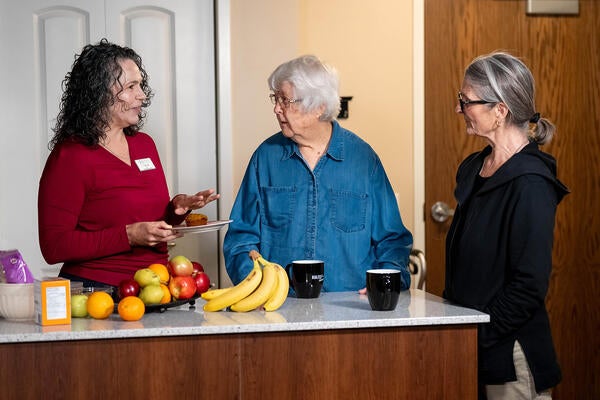
Researchers launch new tools to help people with dementia find their way forward
People can lead meaningful lives after a diagnosis of dementia

People can lead meaningful lives after a diagnosis of dementia
By Faculty of HealthOften, when a person is diagnosed with dementia, available supports are not enough. Most people feel overwhelmed, and they don't get the support, resources and help they need. A new five-country collaboration has developed Forward with Dementia to fill in those gaps and provide the individuals and their families the tools they need to move forward with their lives.
 The Canadian arm of the project is co-led by Carrie McAiney, a professor in the School of Public Health Sciences and Schlegel Research Chair in Dementia at the Schlegel-UW Research Institute for Aging. The initiative aims to improve the diagnostic experience and post-diagnosis care for people living with dementia and their family and friend care partners.
The Canadian arm of the project is co-led by Carrie McAiney, a professor in the School of Public Health Sciences and Schlegel Research Chair in Dementia at the Schlegel-UW Research Institute for Aging. The initiative aims to improve the diagnostic experience and post-diagnosis care for people living with dementia and their family and friend care partners.
“The Forward with Dementia launch brings many in-depth resources on dementia-related topics that we currently don’t see a lot of,” said McAiney. “We aim to help people from the day they get a diagnosis, through managing symptoms, supporting well-being and everything in-between.”
In Ontario, Forward with Dementia will be launched in Waterloo Wellington. An advisory group consisting of persons living with dementia, care partners and health and social care providers have been providing advice and feedback on the website and campaign plans.
“The Forward with Dementia initiative includes the launch of a website that was co-designed with people living with dementia, care partners and health and social care providers, and a campaign to promote the core message of hope that people can live meaningful lives after a diagnosis of dementia.”
 McAiney said the Forward with Dementia website includes tools such as a checklist of questions to ask health-care providers, a guide for sharing a diagnosis with family and friends and strategies to stay physically, cognitively and socially active. “The site also includes stories written by persons living with dementia and care partners that share their experiences of adjusting to the diagnosis and learning to live well with dementia.”
McAiney said the Forward with Dementia website includes tools such as a checklist of questions to ask health-care providers, a guide for sharing a diagnosis with family and friends and strategies to stay physically, cognitively and socially active. “The site also includes stories written by persons living with dementia and care partners that share their experiences of adjusting to the diagnosis and learning to live well with dementia.”
Forward with Dementia is coordinated by Melissa Koch, also at Waterloo, and supported by Waterloo PhD candidate Emma Conway. The next phases of the project, including evaluation and sustainability, will unfold between fall 2021 and summer 2022.

Read more
How machine learning empowers collaboration between computer science, math and medical research

Read more
Dr. Heather Keller discusses the need to transform mealtimes in Canada’s long-term care homes from a service to a meaningful form of care

Read more
“I’m just like you.”
The University of Waterloo acknowledges that much of our work takes place on the traditional territory of the Neutral, Anishinaabeg, and Haudenosaunee peoples. Our main campus is situated on the Haldimand Tract, the land granted to the Six Nations that includes six miles on each side of the Grand River. Our active work toward reconciliation takes place across our campuses through research, learning, teaching, and community building, and is co-ordinated within the Office of Indigenous Relations.